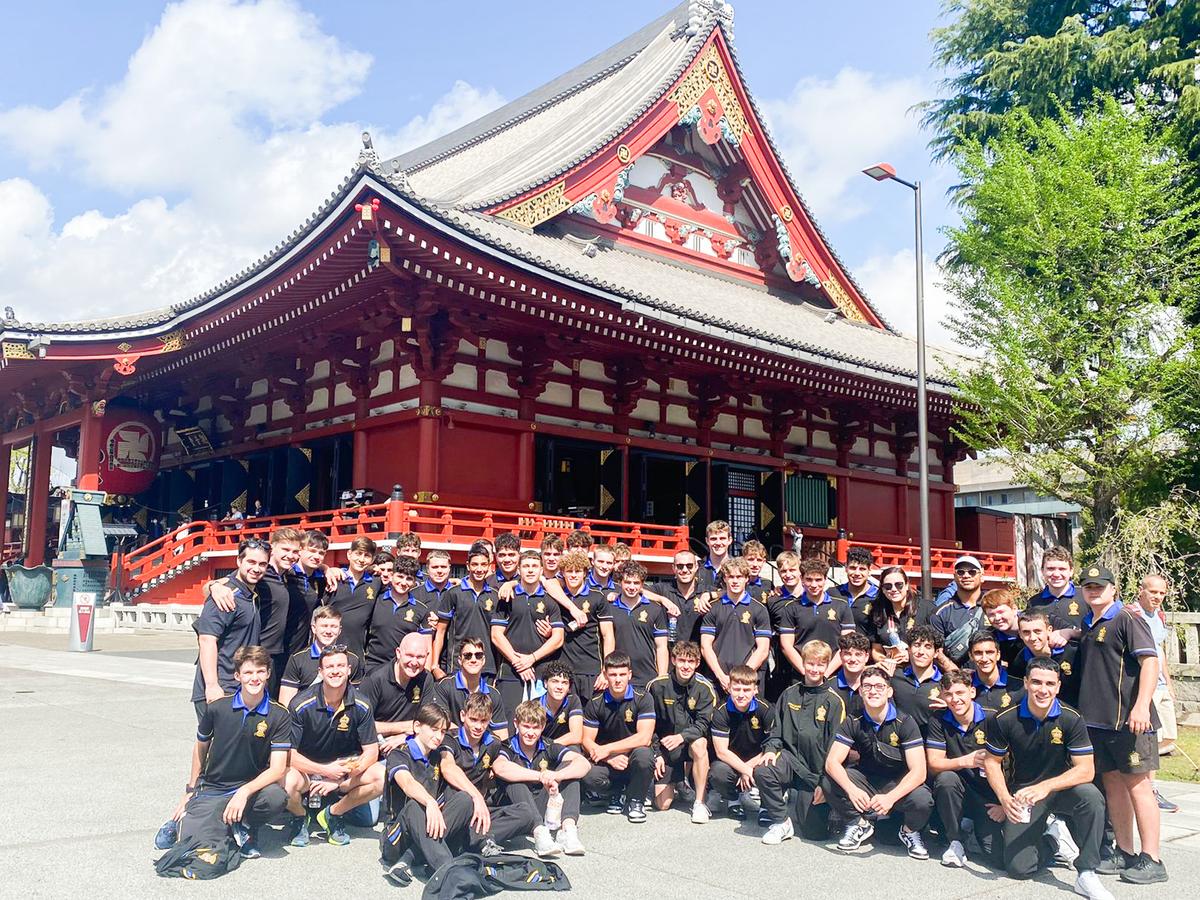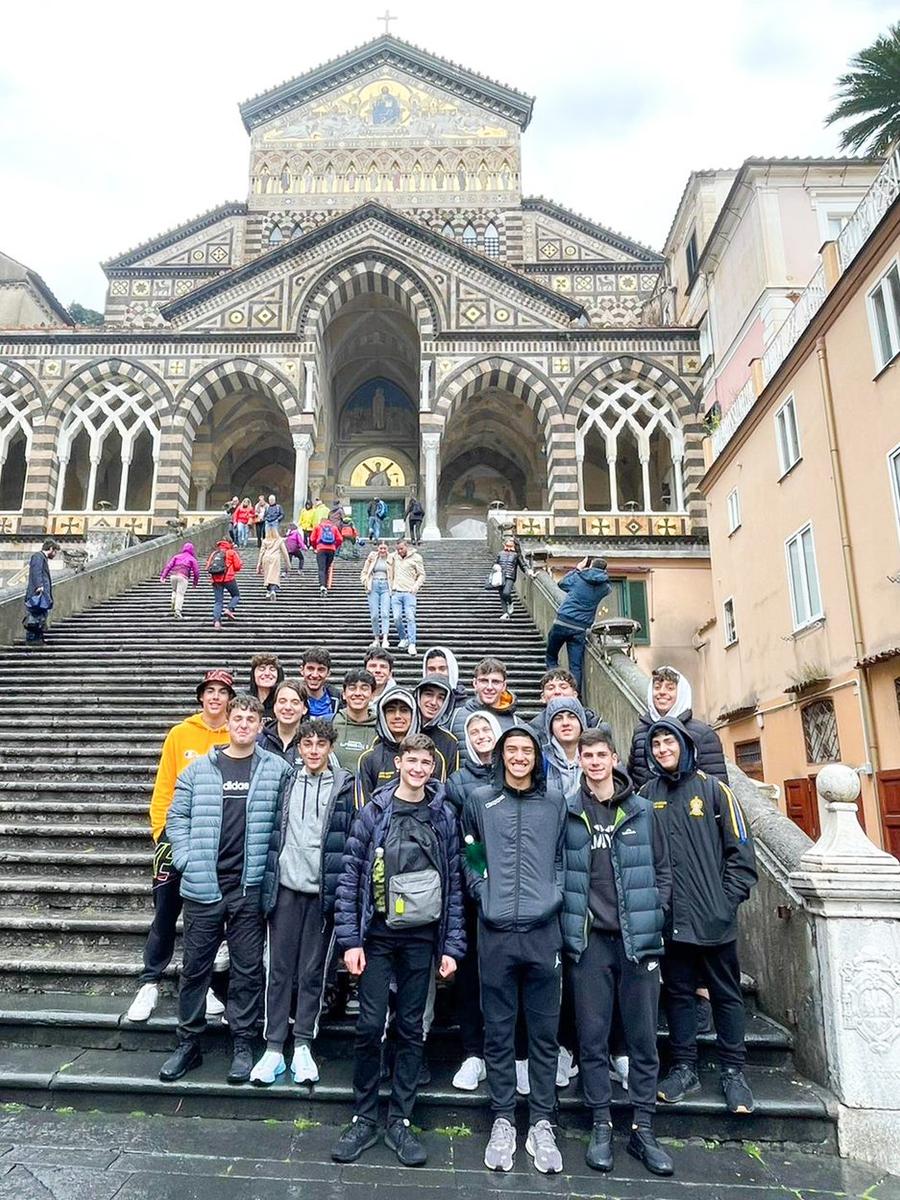Principal

Experiential Learning
A warm welcome back to all members of our community for another busy term. The Easter vacation break was a time when many of our students were engaged in very special experiential learning experiences, namely:
- Rugby Tour to Japan (accompanied by Mr Byrne, Mr Fox, Mr Rowlings, Mr and Mrs Tatola and Mr Khalifeh)
- Italian Cultural Tour (accompanied by Ms Capobianco, Mr Phillipson and Ms Macolino)
- Junior School Football Tour to Brisbane (accompanied by Mr Tropeano, Mr McCarthy and Mr Locke) and
- Junior School Rugby Tour to Armidale (accompanied by Mr and Mrs Tatola and Mr Fields).
Many parents/carers have taken the time to write to me to thank the staff for making these experiences possible. Thank you. I am proud of the generosity of our staff who put the needs of our sons first and foremost.
While organising a trip for a group of students is no small feat, the overarching conclusion is that the benefits that arise far outweigh the time and effort put into organising it. Here are nine common benefits that arise from experiential learning school trips.
1. Improved critical thinking skills
Critical thinking is the ability to think clearly and rationally, understanding the logical connection between ideas. Critical thinking requires you to use your ability to reason. It is about being an active learner rather than a passive recipient of information.
One study found critical thinking is quickly becoming one of the most sought-after skills by employers and something that today's students will need in order to prosper in tomorrow's workplace. Most professionals including lawyers, analysts, accountants, doctors, engineers, reporters, and scientists rely on critical thinking to help them analyse information, systematically solve problems, generate innovative solutions, plan strategically and think creatively.
International and domestic school travel exposes students to real-life learning scenarios where they will have the chance to refine their own critical thinking skills.
2. Experiential learning takes place
While modern resources and new-age teaching styles are continuously improving learning in a classroom environment, advocates for experiential learning argue that when learning concepts are applied to real-life situations, they’re more likely to stick. To prepare students adequately for life beyond study, teachers consider memorable, real-life experiences such as an international school trip in the curriculum as essential.
3. Expanded worldview
Worldview is a personal framework of beliefs, values, and attitudes which affect everything we perceive, think, feel, and do. An individual's worldview is shaped by societal norms and the experiences they have throughout their life.
Immersing students in a new culture will veritably expand their worldview. Away from the familiar comforts of home, exploring a new country, regional town or capital city may encourage students to look at perceived challenges in a more creative way.
4. Reinforce classroom material
Visiting museums and participating in learning workshops that expose students to real-world learning may help them to grasp difficult concepts more easily and reinforce classroom material. By enabling students to apply classroom material to real-world situations, they will understand the value in what they are learning now and how it will help them succeed in life beyond school.
5. Stronger teacher-student relationships
Getting to know our students on an international or domestic school trip is a great way to build a strong rapport with them. We will reap the benefits of this for the rest of the teaching year.
Students who have constructive relationships with their teachers are more likely to do well at school, and teachers who actively build such relationships have a substantial effect on the lives of their students.
6. Build confidence
For many students, an international or domestic school trip may be their first time overseas or interstate without an immediate family member or close friend.
By helping students step outside their comfort zone and try new things – big or small – they will challenge their own beliefs of who they are and what they're capable of doing. When a student experiences a boost of confidence, it may also help raise their self-esteem as they view themselves in a more positive light.
7. Increased motivation in the classroom
International and domestic school trips give students the opportunity to participate in learning workshops or play games of sport at the highest level. Opening our students to a world of possibilities previously perceived as unavailable to them is one of the best ways to increase their motivation in the classroom. When students realise they can materialise their dream of becoming a multilingual ambassador or professional sportsman, they are likely to be more focused at school.
8. All students benefit
As all teachers know, the purpose of it is to prepare students for life, and each student has a unique learning style. Some students are intrapersonal learners, while others flourish in social environments.
International and domestic school travel gives students the chance to experience different styles of learning and see a new side to their subject of study or field of sport. When they can understand the concepts they have learnt about in books or at training sessions being applied in a real-world situation, they often return to the classroom and the sporting field with a deeper connection and greater motivation.
9. Lifelong memories
Our teachers and the students have created lifelong memories from the experiences and opportunities that took place on their international or domestic school trip. The trip may inspire our students to revisit a country or regional centre in the future or propel them into a study and career path they hadn't previously thought of.
We still have three more international and domestic experiences to go: World Youth Day direct to Lisbon, World Youth Day Lisbon and an Italian pilgrimage and our Alice Springs Immersion. All these experiences help us to achieve our stated goal in our Strategic Plan, A Beacon for Boys’ Education, under the Key Focus area of Opportunities: Intentional Formation will include activities such as retreats, immersions, social justice activities, sport, outdoor education, oratory, and the performing arts.
Community News
We welcome the following staff who will be commencing with the College in Term 2:
- Mr Ricki Allan joins the staff today as an English teacher replacing Ms Puthumana.
- Mr Thomas Mullen joins us as a HSIE B Teacher on a temporary full-time contract until the end of the year.
- Ms Katrina Feige joins us as a permanent full-time TAS Assistant.
- We also congratulate Mr Richard Minter and his wife on the birth of their daughter Josephine Louise Williams Minter who was born during the Easter break. All are doing well, and Mr Minter will now be enjoying a period of parental leave and will return to his teaching duties in Week 3 (9th May 2023).
- Mr David Dunne is also on leave.
- There is still a delay with the Scientia Building throwing our moving plans into chaos. I appreciate the ‘pivot’ leadership of our staff. Slow and steady is an apt description for the occupancy of this building. But we have lived through COVID, and we will get through this too!
- We welcome Mr Michael Cutrupi back in his role of Director of Curriculum and thank Mr Nicholas Phillipson for doing such a sterling job during Term 1.
- Mr Simpson is on leave this term, so we welcome Mr Alexandros Sinadinos to the role of Acting Director of Wellbeing. We will enjoy having his expertise on the Leadership Team.
- We also welcome Mr Daniel Mifsud to the Curriculum Team as the Acting Head of PDHPE.
- Mrs Jessica Perri returns to the classroom after a period of parental leave and now begins a flexible work arrangement with Mr Emile Gad.
- This is also Mrs Amanda Forgione’s last week as she goes off to prepare for the impending birth of her bub.
Dr Vittoria Lavorato
Principal
SPC boys can do anything!
**except divide by zero


